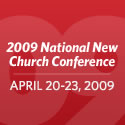
The Five Top Reasons Churches Don’t Grow
Orginally published on Wednesday, January 07, 2009 at 7:06 AM
by Todd Rhoades
Bill Tenny Brittian writes: "When I get called in as a consultant to work with stuck, plateaued, or declining churches I have a couple of things I look for right off the bat. In the vast majority of the cases I discover that their inability to grow, let alone sustain, their membership is caused by one of six issues. And yes, I know this post is called the top FIVE reasons churches donít grow, but I have to throw in the one stopper for church growth, no matter what else is happening. Indeed, you can major on ďfixingĒ the top five for the rest of eternity, but if you donít take care of this one single issue, it will be for naught." What is he talking about? Read on... Iíve said it before, and I suspect Iíll say it again, and again, and again. The most heinous church growth killer is...
[drum roll please]
...unresolved conflict.”
Bill offers some links to articles he’s written on conflict here.
But… continuing on… here are Bill’s top five reasons churches don’t grow. I’ll just list them here… you can go over to Bill’s blog for more information on each one:
5. Ineffective Attendance Tracking
4. Lack of Guest Follow-up
3. Lack of Hospitality
3. Ineffective Assimilation/Discipleship
1. Worship Services that aren’t Worth Shouting About
What do you think? In your experience, what have been the biggest hurdles to growth?
Todd
![]()
This post has been viewed 1710 times so far.
There are 16 Comments:

Hi... I'm Todd Rhoades. I'm a Christ-follower, husband, father and I love to connect leaders with other leaders. Hopefully you'll find something here at MMI you like and will return often. If you want, you can find out more about me or follow my every step on Twitter.
![]()







-
Posted by Andy Wood
Wednesday, January 07, 2009 at 9:29 AM
-
Posted by Cole Hedgecock
Wednesday, January 07, 2009 at 11:56 AM
-
Posted by Armen Shirvanian
Wednesday, January 07, 2009 at 1:44 PM
-
Posted by
Wednesday, January 07, 2009 at 6:24 PM
-
Posted by Jermayn
Wednesday, January 07, 2009 at 8:23 PM
-
Posted by
Wednesday, January 07, 2009 at 8:52 PM
-
Posted by Peter Hamm
Thursday, January 08, 2009 at 6:55 AM
-
Posted by
Thursday, January 08, 2009 at 9:58 AM
-
Posted by
Thursday, January 08, 2009 at 10:33 AM
-
Posted by
Thursday, January 08, 2009 at 11:14 AM
-
Posted by
Thursday, January 08, 2009 at 12:32 PM
-
Posted by
Friday, January 09, 2009 at 3:16 AM
-
Posted by Jermayn
Sunday, January 11, 2009 at 10:04 PM
-
Posted by Jermayn
Sunday, January 11, 2009 at 10:09 PM
-
Posted by KEVIN MILLER
Thursday, January 15, 2009 at 8:45 AM
-
Posted by avandia lawyer
Thursday, February 12, 2009 at 5:51 AM
Post Your Comments:Snobs…
Age group snobs (of virtually any age, but the kids in the nursery are pretty cool).
Denominational (charmismatic/Baptist, etc.) snobs (we’re an Interdenominational church).
Culture (name it) snobs.
And my favorite… Evangelical snobs in the marketplace.
Number 5 seemed like an odd reason at first, but if you are not tracking your numbers, it is impossible to tell when you are in decline. In thinking through the rest of the list, my opinion is that if a church is not warm and friendly, showing guests (and member alike) that they are appreciated, then why would anyone come back or stick around. In my church, we strive for genuine warmth and appreciation for all who come in our church. I like your list, I would simply change the list around:
5. Ineffective Attendance Tracking
4. Ineffective Assimilation/Discipleship
3. Lack of Guest Follow-up
2. Poor Worship Services and Preaching
1. Lack of Hospitality
I think you can be wonderful, but if you donít attempt to show people you care they will not be back. If your worship services stink and people are not nourished, why come back? If people come, but no one cares enough to contact them, why come back? If you care enough to love on them and contact them, but fail to do anything with them (you have got to love people into the church before you can lose them), why stick around? If you are oblivious to who is where, how do you know what is going on.
This is an interesting thing to think aboutÖ Something churches need to track and think about. Thank you for the insight.
It is nice to see how these items relate to the reasons why general creations don’t develop over time. A business might run into issues when its workers don’t keep track of what causes people to make use of its products. Keeping statistics about the use of one’s product lets you know if you should alter something, or if it would be good to leave it as is. It would seem that a church is not too different from other creations that have people behind them, wanting them to grow in size.
I think having an elephant in the room (unresolved conflict) directly affects growth. We had to deal with this in our church when we first came. There were several “elephants” that weren’t talked about or dealt with and the tension was always there and took awhile for us to figure out.
Once all the conflicts were dealt with the church began to see visitors stay.
So, I think if you’ve dealt with the list of 5 but still have undealt with conflict, then you can have the friendliest people, the greatest services, etc and still not grow.
That said, the five listed there are very important.
But people will put up with lousy worship and ho hum preaching if the people are warm and accepting and living out true community. At least, I’ve seen that in the past.
How about lack of God (love, holy spirit, compassion etc) in the church? You can have the best business skills, track everything etc but no God, no growth....
Jermayn:
“How about lack of God (love, holy spirit, compassion etc) in the church? You can have the best business skills, track everything etc but no God, no growth....”
Sadly, things like doctrine, theology, and Christ are no longer requisites for church growth. Consider how many of the churches that have heretical, watered-down, or just plain bad teaching and how they have evolved into being wildly successful. You can definitely run a church like a business and see it grow, completely absent the presence of God.
--
CS
Jermayn and CS
The point isn’t running the church like a business. The point is using excellent leadership practices ("If God has given you leadership ability, take the responsibility seriously. “… read that somewhere) to lead with diligence. Sometimes those look like business practices, because some businesses are led with excellence.
On the other side of your point… Too often those who beat the “sound doctrine” drum, in my experience, are those to whom excellence is foreign (by choice often), by those who are envious of a bigger church, those who are culturally or technically inept or luddite, or those who possess such a long and tangled list of essential distinctives that nobody but them could ever qualify.
The author is not, and I also would not, advocate abandoning sound teaching.
CS, your statement seems to imply that all churches like mine don’t care about what we teach. Not true.
OK, I don’t believe I’m saying this out loud, but I think I agree with CS. I don’t think God calls us to be successful (at least in the human definition) but He calls us to be faithful. I honestly believe that we have let too much of the business world into the church. As an upper manager in the business world, I also think we have too many fads going around rather than sound business practice. I see so many of the same things in the church. Last year we visited some family in DFW area and went to church with them. From what I’ve seen of modern trendy churches, we could have been in DFW, NYC, LA or any of those other initial places. I felt that the church we were in was following a business model. I may be completely off-base and out of touch here, but I don’t think so.
Now in case some of you are wanting to put me in the traditional church camp, I belong to a growing, reaching church in a smaller town. I have been here since I was a teenager (30 yrs) and I have seen our church transition from a very traditiional church to a modern worship style church that is growing and adapting to reach our community for Christ.
What is effective in Lake Forest, CA or Anderson, SC may not be effective in Marshall, TX. I applaud what these guys are doing for the kingdom. My point is that our focus is not on numbers, but faithfulness. I believe that if we are faithful we will see conversions.
Remember what Paul said to Timothy about false teachers, the whole itching ears thing? If we are faithful to teach the true gospel we will see the blessings of God on our churches. Many times these blessings come in ways we don’t expect or even recognize. End of rant for now.
I struggle pitting being faithful against longing for numbers. I struggle pitting sound doctrine with growing or a business model of leadership. This is not an either or. I know many small churches who are faithful to doctrine but reach no one. How about being faithful to the great commission too. How about being faithful to the mission of Christ… Seek and save?
You do not have to abandon doctrine to do these… you can’t be faithful to doctrine without doing these. faithfulness is required, so is excellence, humility, reaching out…
The reasons given are really a failure to love your neighbor as yourself.
Well said Leonard
Peter:
“CS, your statement seems to imply that all churches like mine donít care about what we teach. Not true.”
I’m afraid you’ve intimated something that I did not mean. I celebrate churches where excellence and church growth abounds, when married together with sound doctrine and theology. My point was that if having the true Gospel was a requisite for church growth, then there are some megachurches with huge growth out there that simply shouldn’t exist.
I hate to name names, but consider Joel Osteen’s church. The man almost never mentions sin, judgment, wrath, or Hell. When asked on a national news program relevant theological questions, such as people of other faiths going to Heaven, he said, “I don’t know,” so many times I lost count. It’s obvious that he has huge gaps in his theology and poorly applies Scripture. But, despite all of this, his church has tens of thousands of people and a huge television audience. So, demonstrably, having sound doctrine is not a requisite to a large church.
Travis:
“OK, I donít believe Iím saying this out loud, but I think I agree with CS.”
It’s frightening at first, but don’t worry, you’ll get used to it. =)
--
CS
The biggie? How about todays generation being the problem? No newcomers means no growth. There is a disconnect.
Yes God comes first and then yes use excellent leadership practices as a spiritual leader but the thing is that sadly most churches are structured as a business rather than a God lead church.
btw soz about double posting but CS the mega churches that do not follow sound doctorine may have numbers, tv audiences etc but they will NOT stand the test of time according to God and that is all that matters....
so what is “good growth”? What should we be expecting on an annual basis?
We are in San Diego County. What kind of follow up works for churches in an area like ours?
The reason I’m asking is that I like the conversation I’m hearing here - you seem pretty smart. (but can you dance?)
Many times these blessings come in ways we donít expect or even recognize
Page 1 of 1 pages